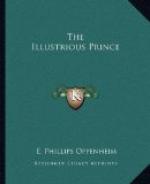“With pleasure,” the Duke answered, who loathed walking.
He directed his coachman to precede them, and they started off, arm in arm.
“Devenham,” the Prime Minister said, “we were speaking, a few minutes ago, of Prince Maiyo. I want you to understand this, that upon that young man depends entirely the success or failure of my administration.”
“You are serious?” the Duke exclaimed.
“Absolutely,” the Prime Minister answered. “I know quite well what he is here for. He is here to make up his mind whether it will pay Japan to renew her treaty with us, or whether it would be more to her advantage to enter into an alliance with any other European power. He has been to most of the capitals in Europe. He has been here with us. By this time he has made up his mind. He knows quite well what his report will be. Yet you can’t get a word out of him. He is a delightful young fellow, I know, but he is as clever as any trained diplomatist I have ever come across. I’ve had him to dine with me alone, and I’ve done all that I could to make him talk. When he went away, I knew just exactly as much as I did before he came.”
“He seems pleased enough with us,” the Duke remarked.
“I am not so sure,” the Prime Minister answered. “He has travelled about a good deal in England. I heard of him in Manchester and Sheffield, Newcastle and Leicester, absolutely unattended. I wonder what he was doing there.”
“From my experience of him,” the Duke said, “I don’t think we shall know until he chooses to tell us.”
“I am afraid you are right,” the Prime Minister declared. “At the same time you might just drop a hint to your wife, and to that remarkably clever young niece of hers, Miss Penelope Morse. Of course, I don’t expect that he would unbosom himself to any one, but, to tell you the truth, as we are situated now, the faintest hint as regards his inclinations, or lack of inclinations, towards certain things would be of immense service. If he criticised any of our institutions, for instance, his remarks would be most interesting. Then he has been spending several months in various capitals. He would not be likely to tell any one his whole impressions of those few months, but a phrase, a word, even a gesture, to a clever woman might mean a great deal. It might also mean a great deal to us.”
“I’ll mention it,” the Duke promised, “but I am afraid my womenfolk are scarcely up to this sort of thing. The best plan would be to tackle him ourselves down at Devenham.”
“I thought of that,” the Prime Minister assented. “That is why I am coming down myself and bringing Bransome. If he will have nothing to say to us within a week or so of his departure, we shall know what to think. Remember my words, Devenham,—when our chronicler dips his pen into the ink and writes of our government, our foreign policy, at least, will be judged by our position in the far East. Exactly what that will be depends upon Prince Maiyo. With a renewal of our treaty we could go to the country tomorrow. Without it, especially if the refusal should come from them, there will be some very ugly writing across the page.”




